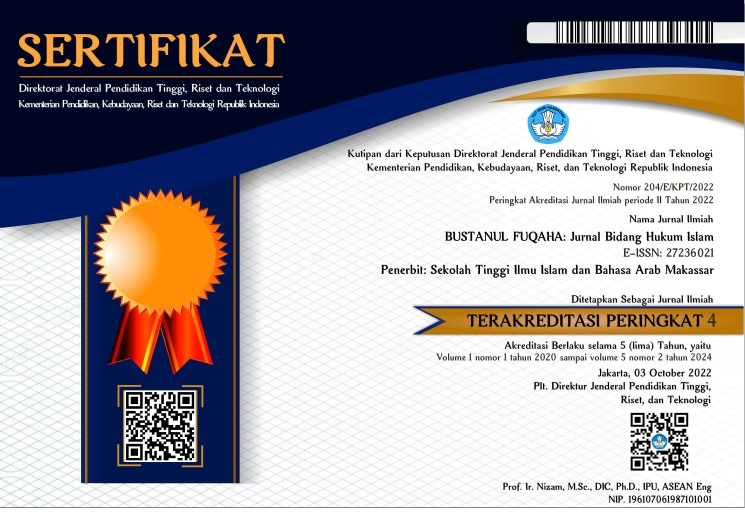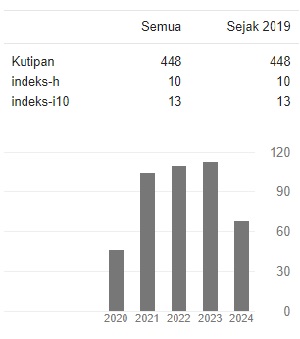Konsep Dasar Ijmak sebagai Sumber Hukum Islam
DOI:
https://doi.org/10.36701/bustanul.v1i1.125Keywords:
koran, hadis, consensus, fiqh, law.Abstract
This study aimed to describe the basic concept of consensus as source of Islamic law. The description of basic concept of consensus consists of: 1) definition of consensus; 2) status of consensus as a fundament of Islamic knowledge and law; 3) types of consensus; 4) examples of consensus in terms of classical and contemporary Islamic jurisprudence; and 5) law of refutation against consensus. The research applied a qualitative-descriptive approach with library research methods combined with content analysis of a number of books and related articles. The results show that: 1) consensus is an agreement of scholars of mujtahid among the people of Prophet Muhammad saw. on an shari issue that is not obviously found in the Koran and hadis in the period after the Prophet which has specific pillars and conditions; 2) of consensus in its position as a source of knowledge and Islamic law is in the third row after the Koran and hadis; 3) types of consensus include ṣarīh consensus and sukūtī consensus, and some divides it into qat’i consensus and dzanni consensus; 4) some examples of consensus: a) forms of classical Islamic jurisprudence consensus: the agreement of the scholars regarding the prohibition of marrying grandmother and granddaughter, that grandson and son are in one position in terms of inheritance division, that inheritance portion for grandmother is one sixth if there is no mother, and consensus of the companions to codify the Koran owing to benefits that appeared during the caliphate of Abu Bakr al-Shiddiq ra. b) Forms of contemporary Islamic jurisprudence: validity of human organ transplants, brain death, animal and human cloning, joint-stock companies, stock exchanges, globalization, and compliance with international institutions, regulations and laws such as world education organizations and world trade organizations; and 5) law of those who refute consensus in absolute manner (totality) are considered disbelievers.
Downloads
References
Ahmad Syaripudin. (2019). Buku Ajar Metodologi Studi Islam, Cet. I; Surabaya: Pustaka Media Guru.
al-As’adī, Muhammad Ubaidillah. (2001). Al-Maujiz fī Uṣūl Fiqh. Cet. II. Mesir: Dār al-Salam.
Asmawi. (2011). Perbandingan Ushul Fiqh. Jakarta: Amzah.
al-Wazīr, Ahmad bin Muhammad bin ‘Alī. (1996). al-Muṣṭafā fī Uṣūl al-Fiqh. Cet. I; Beirut: Dar al-Fikr.
al-Zarkasyî, Badr al-Din Muhammad ibn ‘Abdillah. (1992). Al-Bahr al-Muhith fi Ushul al-Fiqh, Jilid. 6, Cet. II; Wizaratul Auqaf.
al-Zuhailī, Muhammad Muṭafā.(2006). Al-Wajīz fī Uṣūl al-Fiqh al-Islāmī. Dār al-Khair. Cet. II. Juz. I.
Bakry, K. (2018). Konsep Syūrā dalam al-Quran. NUKHBATUL'ULUM: Jurnal Bidang Kajian Islam, 4(1), 70-83.
Hakim, ‘Abd al-Ḥamīd. (2007). Al-Sullam. Juz. II. Jakarta. Maktabah al-Sa’adiyah Putra.
Haroen, Nasrun.(1997). Ushul Fiqh. Jakarta: Logos Wacana Ilmu.
Ibn al-Najar, Muhammad bin Ahmad bin Abd al-Aziz. (1997). al-Kaukab al-Munir Syarah Mukhtasar al-Tahrir, Jilid 1, Cet. I; Maktabah al-'Abikan.
Iskandar, A., Aqbar, K. (2019). Green Economy Indonesia Dalam Perspektif Maqashid Syari’ah. Al-Mashrafiyah: Jurnal Ekonomi, Keuangan, dan Perbankan Syariah,3(2), h.83-94.
Khallaf, Abdul Wahab.(2002). Ilm Uṣūl Fiqh. Cet. XII; Dār al-Fikr.
Khon, Abdul Majid. (2012). Ulum al-Hadis, Cet. I; Jakarta: Amzah.
Syafiruddin, Amir. (2011). Usul Fiqh. Cet. V. Jakarta: Kencana Prenada Media Group.
Zaidān, ‘Abd al-Karīm. Al-Wajīz Fi Uṣūl al-Fiqh. Muassasah al-Risālah. t.th.
________. 2019. https://alfawzan.af.org.sa/ar/node/2387. (19 September 2019).
________. 2019. https://alukah.net/sharia/0/73778/. (25 September 2019).
_________. 2019. https://islamqa.info/ar/answers/201682/. (29 September 2019).














